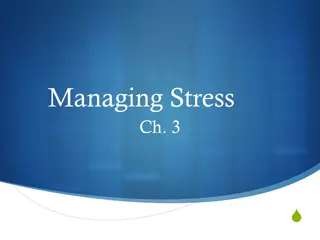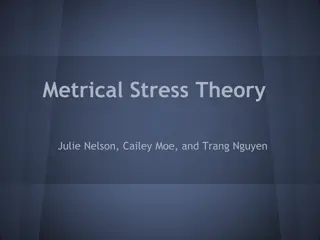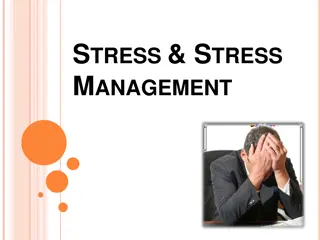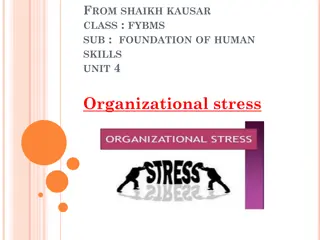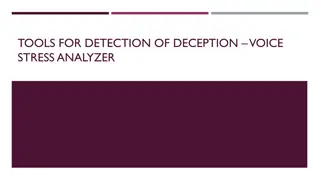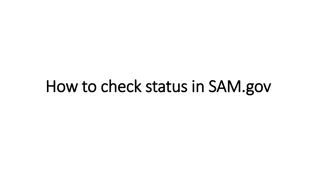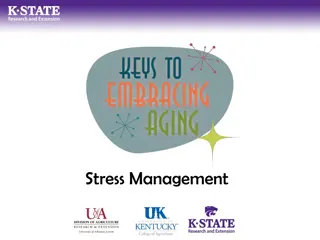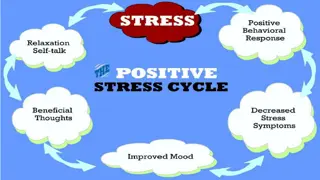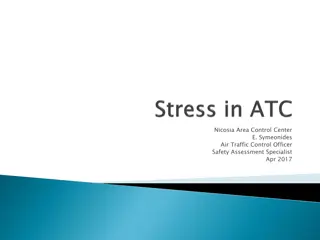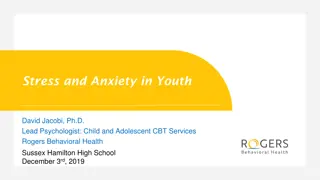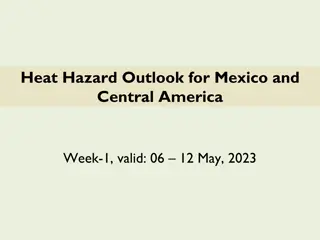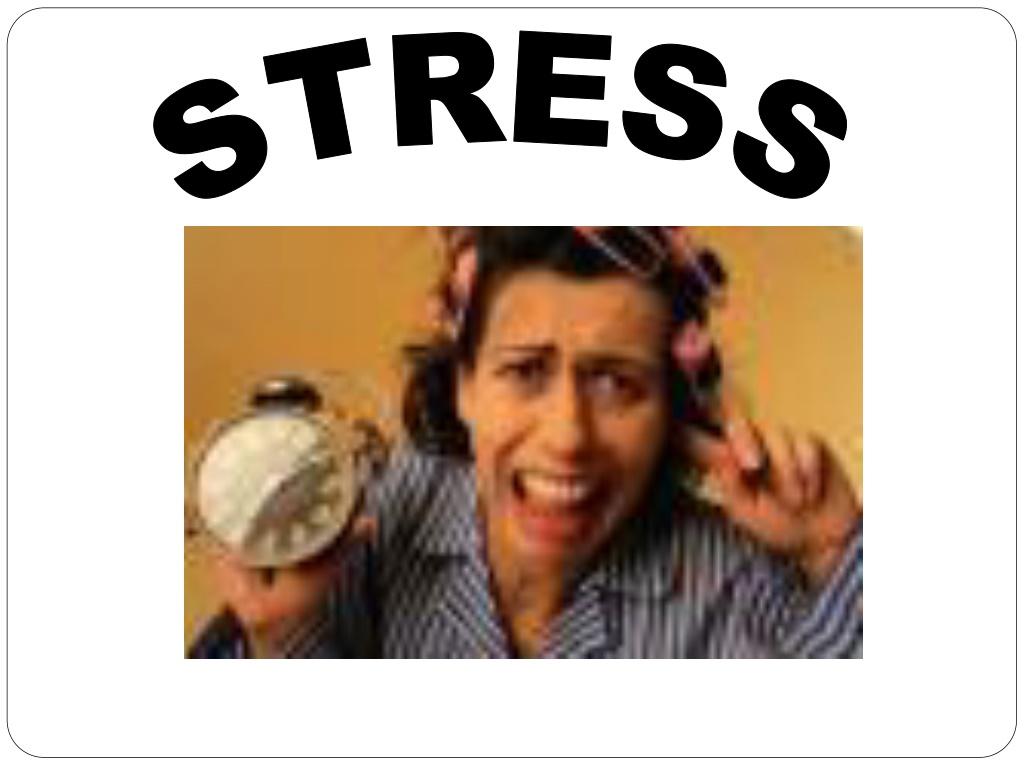
Understanding Stress and Its Impact on the Body
Explore the concept of stress, its definitions, key terms, and physical responses in this informative content. Discover how the body responds to stressful situations, the fight-or-flight response, and the messenger systems involved in stress management.
Download Presentation

Please find below an Image/Link to download the presentation.
The content on the website is provided AS IS for your information and personal use only. It may not be sold, licensed, or shared on other websites without obtaining consent from the author. If you encounter any issues during the download, it is possible that the publisher has removed the file from their server.
You are allowed to download the files provided on this website for personal or commercial use, subject to the condition that they are used lawfully. All files are the property of their respective owners.
The content on the website is provided AS IS for your information and personal use only. It may not be sold, licensed, or shared on other websites without obtaining consent from the author.
E N D
Presentation Transcript
What is it? Stress is the body s response to threatening (real or perceived) environmental conditions. Stressors things that cause both psychological and physical changes, like an exam!
Another definition of Stress Another definition of Stress A state of psychological tension and physiological arousal produced by a stressor Refers to the lack of fit between the perceived demands of the situation and the person s ability to cope Ms R Kitchen 2005
Key Terms Key Terms - - Stressor Something in the environment (such as exams or work pressure) that produces a stress response in a person Stressor Complete the worksheet Ms R Kitchen 2005
Fight or Flight Fido enters the classroom looking for trouble, you have 2 choices run or take him on For either of these options what would you need? Energy!!!! The Fight or Flight Response = the reaction of the nervous system in response to a stressful situation that produces energy to prepare the body extended and demanding amounts of effort Ms R Kitchen 2005
How Does the Body Know it Has to How Does the Body Know it Has to Respond? Respond? The body has 2 messenger systems: 1 is fast 1 is slow 1. Nervous System - travels through neurons (or nerve cells) very fast transmission of information 2. Endocrine System hormones that travel through the blood much slower transmission Ms R Kitchen 2005
What is the physical change? This is often referred to as the flight-or- fight response The main areas involved include the hypothalamus, nervous system, endocrine system, adrenaline, the pituitary gland, ACTH and cortisol
Nervous System Central Nervous System Brain & Spinal Cord Peripheral Nervous System AUTONOMIC NERVOUS SYSTEM Muscles not attached to bone (heart, stomach, Diaphragm) Involuntary happens without thinking Somatic Nervous System Operates nerves attached to bone PARASYMPATHETIC NERVOUS SYSTEM KEY SECTIONS FOR STRESS SYMPATHETIC NERVOUS SYSTEM Ms R Kitchen 2005
The Stress Reaction Aerobics Stressor H.P.A. S.A.M. HYPOTHALAMUS Releases Activates the CRF Hormone Sympathetic branch of the Autonomic Nervous System Signals to the Pituitary Gland Adrenal Gland To release ACTH Adrenal Cortex Activates fight or flight response Adrenal Medulla releases Adrenaline and Noradrenaline Increases Decreases Corticosteroids into the blood Heart rate Suppress Immune System Digestion Blood Pressure Convert fat & protein into sugar Saliva production Pupil Size Size of Blood vessels Breathing Ms R Kitchen 2005 Energy ready for fight or flight Muscle Activity
Chronic Vs Acute stress On your worksheet, fill in the gaps. Then : List responses are produced by the Hypothalamic- Pituitary-Adrenal Axis (HPA) List responses are produced by the Sympathetic- Adrenomedullary Axis (S.A.M.) Stretch and Challenge exam style questions
Stretch and Challenge Stretch and Challenge Extension Material from here onwards Extension Material from here onwards So is all stress the same? Theorists suggest that there are different types of stress: 1. Frustration stress pursuit of some goal is thwarted 2. Conflict stress two or more motivations or behavioural impulses are competing for expression 3. Change stress even positive changes are still changes 4. Pressure stress expectations or demands to behave in a certain way
Do we experience it in the same way? Cognitive appraisal theory would say that stress lies in the eye of the beholder Primary appraisal initial evaluation 1) irrelevant? 2) relevant but not a threat? 3) stressful? Secondary appraisal evaluation of coping resources and options Stress is therefore subjective interpretation of an event is important; it will only be seen as stressful if it is first perceived as a threat and the person does not have the resources to cope Factors that influence this will include gender, culture, personality and biology TASK: Consider and discuss your own experiences of flying in an airplane
Why is stress a problem? Stress is certainly a very useful adaptive mechanism that promotes survival in the animal kingdom In our human world however, with such different stressors, there are many potential negative consequences: a) Direct physiological effects - elevated blood pressure, weakened immune system, increased hormonal activity, psychophysiological conditions b) Harmful behaviours smoking, alcohol, drugs, poor nutrition, less sleep c) Indirect health-related problems decreased compliance, delayed care seeking
Why is it important to study it? As well as preventing the associated negative health consequences for the individual it has important implications for society: It costs the country millions of pounds a year in days off work and stress related illnesses It contributes to countless broken marriages, arguments and neglected children


